Lists of political office-holders in East Germany
 |
|---|
These are lists of political office-holders in East Germany.
Overview[edit]
The political leadership of East Germany was distributed between several offices. The Socialist Unity Party of Germany (SED) and its leader held ultimate power and authority over state and government.
Prior to the proclamation of an East German state, the Soviets established the German Economic Commission (DWK) in 1948 as a de facto government in their occupation zone. Its chairman was Heinrich Rau.
On 7 October 1949 an East German state, called the German Democratic Republic (GDR), was proclaimed and took over governmental functions from the DWK, largely with the same leading figures.
Until autumn of 1989, the most important position in the GDR was that of the General Secretary of the (SED), titled as the First Secretary between 1953 and 1976. The GDR Constitution contained a section granting the SED a monopoly on power, making the General Secretary the de facto leader of the country. He and the party Politburo, which he headed, set all policy, with both cabinet and parliament acting as a rubber stamp implementing the decisions.
The formal head of state was originally the President of the German Democratic Republic. After the death of incumbent Wilhelm Pieck in 1960, the office was replaced by a collective body as the head of state, the State Council. The position of chairman was commonly held by the party leader.
Government was headed by the Council of Ministers and its chairman, sometimes colloquially called Prime Minister. However, all the decisions were made by the party, with the cabinet implementing them. Indeed, the SED Central Committee had committees mirroring the cabinet departments.
Other important institutions included the People's Chamber, the legislature whose sessions were chaired by a President of the People's Chamber, and, since 1960, the National Defense Council, which held supreme command of the GDR's armed forces and had unlimited authority over the State in time of war. The Council was composed exclusively of members of the SED's Central Committee and Politburo, with the party leader serving as Chairman of the National Defense Council.
The political landscape was completely changed by the Peaceful Revolution late in 1989, which saw the SED having to relinquish its monopoly on political power and the National Defense Council and the State Council being abolished. The remaining institutions were the People's Chamber, whose President became head of state by default for the remainder of the GDR's existence, and the Council of Ministers, both now constituted on basis of the country's first and only democratic elections in March 1990. The GDR joined the Federal Republic of Germany on 3 October 1990
Leaders of the Socialist Unity Party of Germany (SED)[edit]
| Leadership of East Germany | |
|---|---|
 | |
| Residence | Schönhausen Palace Majakowskiring Waldsiedlung |
| Formation | 7 October 1949 |
| First holder |
|
| Final holder |
|
| Abolished |
|
| No. | Portrait | Name | Took office | Left office | Time in office | Party | |
|---|---|---|---|---|---|---|---|
| Joint Chairmen of the Socialist Unity Party Vorsitzende der Sozialistischen Einheitspartei Deutschlands | |||||||
| . | Wilhelm Pieck (1876–1960) | 22 April 1946 | 25 July 1950 | 4 years, 94 days | SED | ||
| . | Otto Grotewohl (1894–1964) | 22 April 1946 | 25 July 1950 | 4 years, 94 days | SED | ||
| General Secretary of the Central Committee (First Secretary of the Central Committee 1953–1976) Generalsekretär/Erster Sekretär des Zentralkommitees | |||||||
| 1 | Walter Ulbricht (1893–1973) | 25 July 1950 | 3 May 1971 | 20 years, 282 days | SED | ||
| 2 | Erich Honecker (1912–1994) | 3 May 1971 | 18 October 1989 | 18 years, 168 days | SED | ||
| 3 | Egon Krenz (born 1937) | 18 October 1989 | 6 December 1989 | 49 days | SED | ||
| (Honorary) Chairman of the Central Committee Vorsitzender des Zentralkommitees | |||||||
| 1 | Walter Ulbricht (1893–1973) | 3 May 1971 | 1 August 1973 † | 2 years, 90 days | SED | ||
On 1 December 1989, the People's Chamber removed the section of the East German Constitution granting the SED a monopoly of power—thus ending Communist rule in East Germany. Before the month was out, the SED transformed from a Leninist cadre party into a democratic socialist party, renaming itself first to Socialist Unity Party — Party of Democratic Socialism and later in the same year, to Party of Democratic Socialism (PDS). Hence, the party's subsequent leaders were no more leaders of East Germany than the leaders of other parties.
Heads of state[edit]
| No. | Portrait | Name | Took office | Left office | Time in office | Party | |
|---|---|---|---|---|---|---|---|
| President of the Republic Präsident der Republik | |||||||
| – | Johannes Dieckmann (1893–1969) Acting | 7 October 1949 | 11 October 1949 | 4 days | LDPD | ||
| 1 | Wilhelm Pieck (1876–1960) | 11 October 1949 | 7 September 1960 † | 10 years, 332 days | SED | ||
| – | Johannes Dieckmann (1893–1969) Acting | 7 September 1960 | 12 September 1960 | 5 days | LDPD | ||
| Chairman of the State Council Vorsitzender des Staatsrats | |||||||
| 1 | Walter Ulbricht (1893–1973) | 12 September 1960 | 1 August 1973 † | 12 years, 323 days | SED | ||
| – | Friedrich Ebert Jr. (1894–1979) Acting | 1 August 1973 | 3 October 1973 | 63 days | SED | ||
| 2 | Willi Stoph (1914–1999) | 3 October 1973 | 29 October 1976 | 3 years, 26 days | SED | ||
| 3 | Erich Honecker (1912–1994) | 29 October 1976 | 24 October 1989 | 12 years, 360 days | SED | ||
| 4 | Egon Krenz (born 1937) | 24 October 1989 | 6 December 1989 | 43 days | SED | ||
| 5 | Manfred Gerlach (1928–2011) | 6 December 1989 | 5 April 1990 | 120 days | LDPD | ||
| President of the People's Chamber[a] Präsident der Volkskammer | |||||||
| – | Sabine Bergmann-Pohl (born 1946) Acting | 5 April 1990 | 2 October 1990 | 180 days | CDU | ||
Heads of government[edit]
| No. | Portrait | Name | Took office | Left office | Time in office | Party | |
|---|---|---|---|---|---|---|---|
| Minister-President Ministerpräsident | |||||||
| 1 | Otto Grotewohl (1894–1964) | 12 October 1949 | 21 September 1964 † | 14 years, 345 days | SED | ||
| Chairman of the Council of Ministers Vorsitzender des Ministerrats | |||||||
| 2 | Willi Stoph (1914–1999) | 21 September 1964 | 3 October 1973 | 9 years, 12 days | SED | ||
| 3 | Horst Sindermann (1915–1990) | 3 October 1973 | 29 October 1976 | 3 years, 26 days | SED | ||
| (2) | Willi Stoph (1914–1999) | 29 October 1976 | 13 November 1989 | 13 years, 15 days | SED | ||
| 4 | Hans Modrow (1928–2023) | 13 November 1989 | 12 April 1990 | 150 days | SED PDS | ||
| Minister-President Ministerpräsident | |||||||
| 5 | Lothar de Maizière (born 1940) | 12 April 1990 | 2 October 1990 | 173 days | CDU | ||
Heads of parliament[edit]
| No. | Portrait | Name | Took office | Left office | Time in office | Party | |
|---|---|---|---|---|---|---|---|
| President of the People's Chamber Präsident der Volkskammer | |||||||
| 1 | Johannes Dieckmann (1893–1969) | 7 October 1949 | 22 February 1969 † | 19 years, 138 days | LDPD | ||
| 2 | Gerald Götting (1923–2015) | 12 May 1969 | 29 October 1976 | 7 years, 170 days | CDU | ||
| 3 | Horst Sindermann (1915–1990) | 29 October 1976 | 13 November 1989 | 13 years, 15 days | SED | ||
| 4 | Günther Maleuda (1931–2012) | 13 November 1989 | 5 April 1990 | 143 days | DBD | ||
| 5 | Sabine Bergmann-Pohl (born 1946) | 5 April 1990 | 2 October 1990 | 180 days | CDU | ||
Heads of the military[edit]
| No. | Portrait | Chairman of the National Defence Council Vorsitzender des Nationalen Verteidigungsrates | Took office | Left office | Time in office | Party | |
|---|---|---|---|---|---|---|---|
| 1 | Walter Ulbricht (1893–1973) | 10 February 1960 | 3 May 1971 | 11 years, 82 days | SED | ||
| 2 | Erich Honecker (1912–1994) | 3 May 1971 | 18 October 1989 | 18 years, 168 days | SED | ||
| 3 | Egon Krenz (born 1937) | 18 October 1989 | 6 December 1989 | 49 days | SED | ||


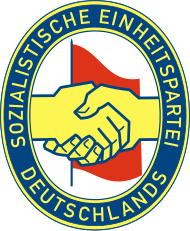




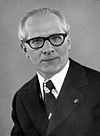
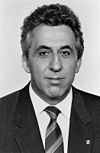




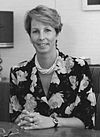
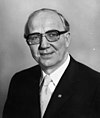




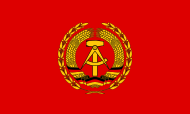
No comments:
Post a Comment